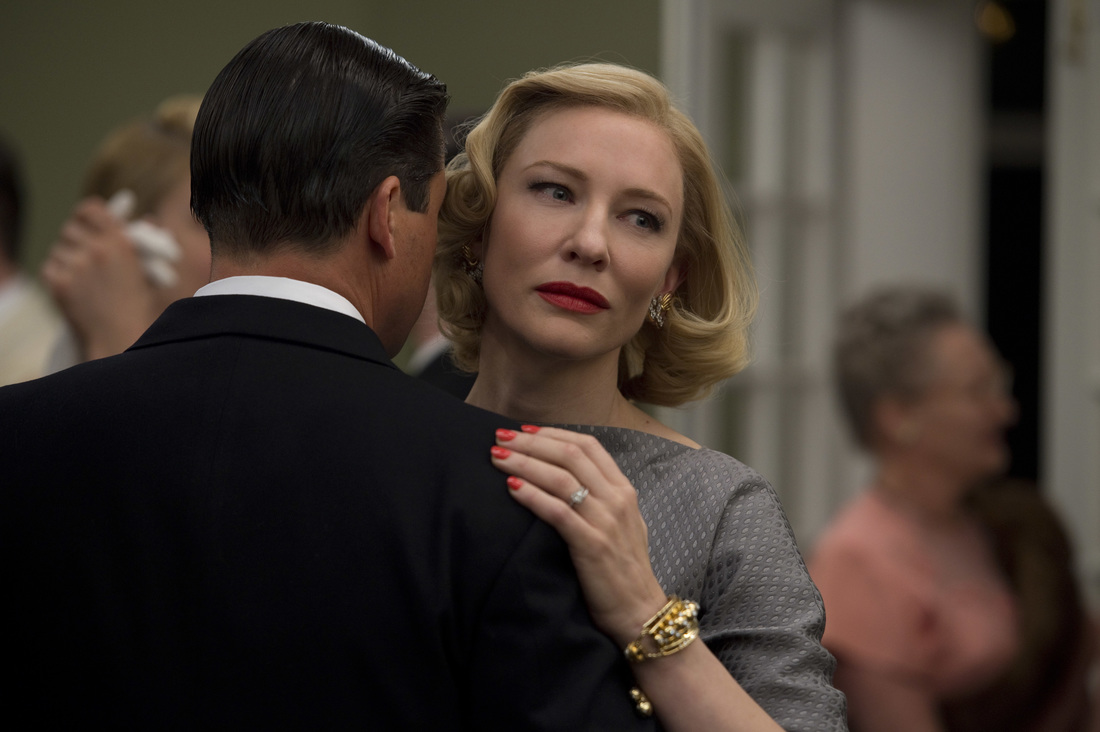Director Todd Haynes’s (Safe, Far From Heaven) Carol is a stellar period piece. From its initial shots through a sidewalk grate of a particularly misty, aquamarine evening in Manhattan, talented cinematographer Edward Lachman gives the otherwise historical romance film a unique metropolitan luster. The time and setting are essential to understanding the arduous burn of Haynes’s pacing. Therese and Carol have an instant compatible connection, but their love at the time is near impossible. Every accidental touch feels explosive, every after-hours phone call is covertly intimate. In a scene where the women start to get to know each other in a dreamy golden room soundtracked by a genial piano-playing, Carol’s drunk husband (Kyle Chandler) interferes as a staggering reminder of reality. Carol and Therese exchange a phone call soon after where the conversation awkwardly circles the desire to be more for each other until Carol almost sobbingly pleads “Ask me things. Please”.
Blanchett’s delivery of that line and general performance is stirring. She’s poised on the outside, elegantly dressed in fur coats and always gracefully holding a cigarette, but internally emotionally troubled by the world pitted against her. Blanchett has a perfectly controlled tone that trembles and boasts in the same breath, holding the audience’s gaze the same way she holds Therese’s. Rooney Mara’s Therese is equally great, with Mara especially excelling at her rants of confusion at a time where feelings toward an older female had no place. They both shine at giving an emotional and physical reaction when words aren’t enough, especially during a decade where they don’t have a language to express how they feel.
Haynes is known for providing sociopolitical commentary with his stories. In 1995’s Safe, he critiques a superficial society that lacks individuality and shoulders blame for things they cannot control. Safe’s lead Julianne Moore is pushed to one of her most excellent performances, similar to how Haynes expertly handles Blanchett and Mara in Carol. He often places Therese and Carol behind glass or shows them through store windows, as a way of showcasing the middle class women’s suppressed emotional pain, just like in Safe. These women are best analyzed from a distance, like in a museum, as if the audience can see what they’re going through but never fully empathize with their struggles. Haynes is a master of ethos, carefully depicting the reserve of the era using every filmic element (dialogue, camerawork, symbolism, characters, music, etc) he has available.
Haynes recognizes that dignified camerawork and storytelling strengthened by breathtaking performances has an exceptional impact. The only words I could use to describe Carol immediately after seeing it were “absolutely beautiful,” and the statement still stands after longer evaluation. Ansari’s Modern Romance chronicles the ease of love these days; gay marriage is legal in the U.S, we can stalk our exes on Facebook, we can communicate as quick as hitting the “Send” button on a text message. Carol is a subtle yet eye-opening glance at a time where none of that was possible, where love with the same gender could feel wrong and even dangerous. It’s a slow-burning, engaging story of melodrama that manages to engross emotions despite being so calculated. The deliberation isn’t cheeky, just well thought-out and enough to make the audience crave nothing more once the movie’s over, other than to just experience it all again.
Grade: A

 RSS Feed
RSS Feed
